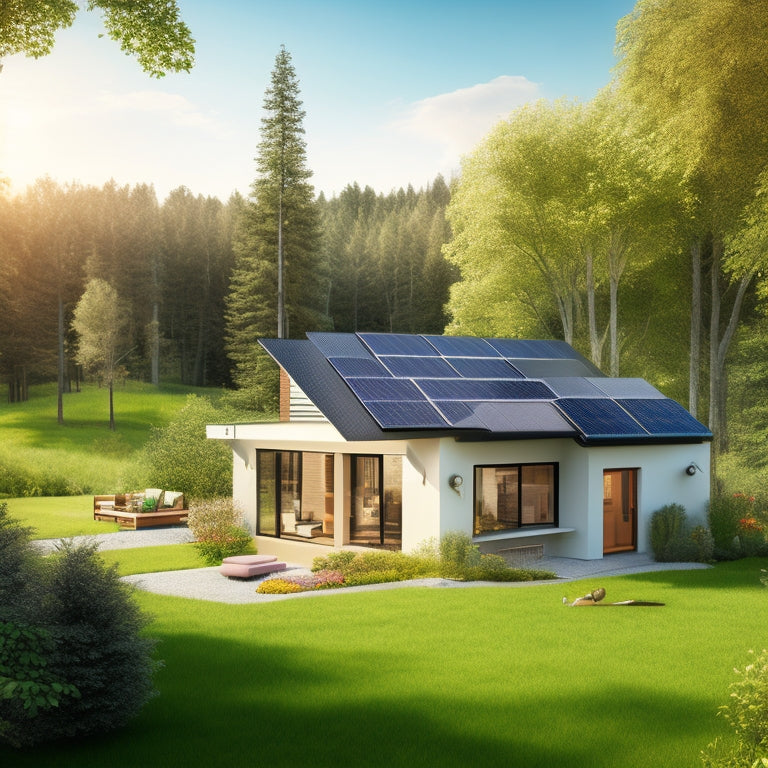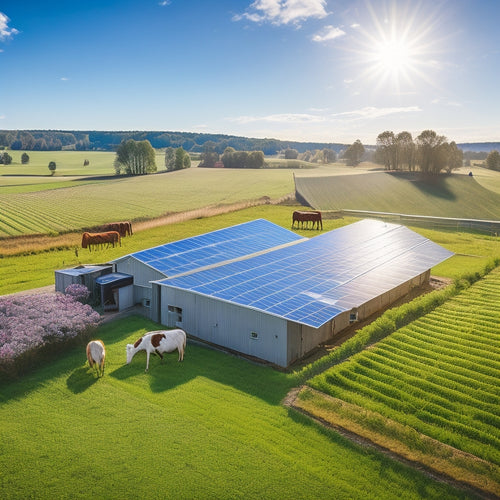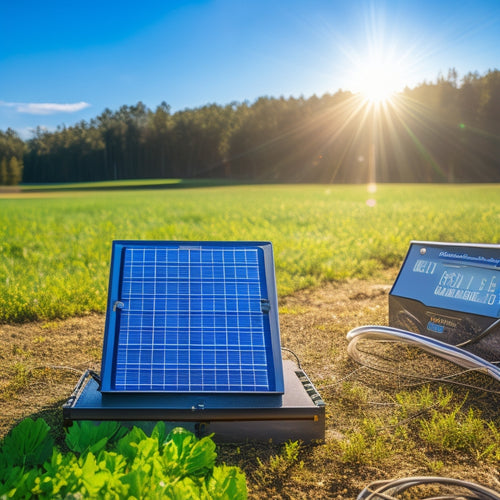
What's the Best Home Energy Independence Solution?
Share
You'll want a thorough home energy independence solution that integrates top-tier solar panel providers, efficient energy storage, and seamless grid connection. Start by selecting a reputable provider offering state-of-the-art innovations for maximum energy output and efficiency. Next, consider financing options, such as solar loans and leasing, to offset upfront installation costs. High-efficiency solar panels and home battery storage systems will optimize energy usage and provide reliable backup power during outages. Finally, guarantee a smooth grid connection through net metering, and monitor your energy usage with advanced metering infrastructure. As you investigate these components, you'll reveal the key to achieving true energy independence.
Overview
- Select a reputable solar panel provider offering state-of-the-art innovations for maximum energy output and efficiency to ensure a reliable energy independence solution.
- Consider integrating home battery storage systems with solar panels to optimize energy storage and manage energy production and consumption effectively.
- Financing options like solar loans, leasing, and tax incentives can make the upfront investment in solar energy more affordable and accessible.
- High-efficiency solar panels with advanced features like bifacial technology and low temperature coefficients can reduce size and cost while maintaining peak performance.
- Net metering and grid connection enable selling excess energy back to utility companies, providing energy security and grid resilience while offsetting energy costs.
Top Home Solar Panel Providers
Your expedition to home energy independence begins with selecting a reputable solar panel provider.
You'll want a company that offers state-of-the-art solar panel innovations, ensuring maximum energy output and efficiency. Look for providers with a proven track record of successful installations and excellent customer service.
Installation warranties are also essential, providing protection for your investment and peace of mind. Top providers typically offer extensive warranties, covering both the panels and labor for an extended period.
When evaluating providers, consider their ability to integrate with home battery systems, which can optimize energy storage and backup capabilities.
Research and compare different providers, considering factors such as panel quality, installation knowledge, and maintenance support.
Average Solar Panel Installation Costs
The upfront investment in solar energy can be substantial, but understanding the average solar panel installation costs is essential in determining the feasibility of your energy independence project.
As you consider going solar, you'll need to factor in the costs of purchasing and installing the panels, as well as additional expenses like installation permits and inspections.
System design and component costs play a significant role in the overall expense, and evaluating components such as solar panels, inverters, and mounting hardware can help you make informed decisions.
On average, the total installation cost for a residential solar panel system can range from $15,000 to $30,000 or more, depending on the system size and quality.
However, you may be eligible for solar panel incentives, such as the federal solar investment tax credit, which can help offset some of these costs.
Financing Options for Home Solar
Solar panel financing options are becoming increasingly accessible, allowing homeowners like you to overcome the upfront costs associated with going solar. You can investigate solar loans, which provide flexible repayment terms and low interest rates.
Leasing options are also available, where you pay a fixed monthly rate to use the solar panels without owning them. With careful assessment of system size and complexity, you can optimize your system design and reduce installation costs.
Additionally, considering the type and quality of equipment can guarantee reliability, durability, and performance. Take advantage of tax incentives, such as the Solar Investment Tax Credit, which can cover up to 26% of your solar panel installation costs.
Additionally, state rebates, financing grants, and community solar programs can help reduce your expenses. Crowdfunding platforms can also be a viable option to fund your solar project.
Solar Panel Efficiency and Quality
Now that you've investigated financing options, it's time to focus on the heart of your home energy independence solution: the solar panels themselves. You want to guarantee you're getting the most efficient and high-quality panels to maximize your energy conversion. Solar panel technology has come a long way, and it's crucial to understand the differences.
| Efficiency Feature | Description |
|---|---|
| Monocrystalline vs Polycrystalline | Mono panels have higher efficiency rates (15-20%) due to purer silicon crystals |
| Bifacial Panels | Can capture light from both sides, increasing energy output by up to 25% |
| High-Efficiency Cells | Latest cells boast efficiencies of up to 23%, reducing panel size and cost |
| Heat Tolerance | Look for panels with low temperature coefficients for peak performance in high heat |
| Warranty and Durability | A 25-year warranty and durable materials guarantee long-term energy independence |
When selecting solar panels, prioritize efficiency, quality, and durability to guarantee a reliable energy conversion system for your home.
Home Battery Storage Systems
You're likely evaluating home battery storage systems to guarantee a reliable backup power supply and optimize your energy independence.
When assessing these systems, two critical factors to take into account are energy storage capacity and backup power reliability.
Energy Storage Capacity
Tapping into the full potential of your renewable energy system requires a reliable energy storage capacity, which is where home battery storage systems come into play.
You need a system that can efficiently manage your energy production and consumption. This is where energy management comes in – it optimizes your energy usage, ensuring you get the most out of your renewable energy system.
With a home battery storage system, you can integrate your renewable energy sources seamlessly, storing excess energy for later use. This renewable integration enables you to reduce your reliance on the grid, giving you more control over your energy independence.
Backup Power Reliability
Your home battery storage system's backup power reliability is critical to ensuring uninterrupted energy supply during grid outages or emergencies. With a reliable system, you can rest assured that your home remains powered even when the grid fails. This is especially important for households with critical medical equipment, refrigeration, or communication needs.
| Backup Power Reliability Feature | Description |
| Depth of Discharge (DOD) Protection | Prevents over-discharging, ensuring battery longevity |
| Automatic Switching | Instantly switches to battery power during outages |
| Surge Capacity | Handles sudden power surges, protecting your equipment |
| Grid Sync Capability | Seamlessly integrates with renewable energy sources |
| Monitoring and Control | Real-time monitoring and control for peak performance |
Net Metering and Grid Connection
When you're generating more electricity than you're consuming, you'll want to investigate the benefits of a grid connection, which allows you to sell excess energy back to the utility company and offset your energy bills.
The net metering process involves installing a specialized meter that tracks both the electricity you produce and consume, ensuring accurate billing.
Grid Connection Benefits
Frequently, homeowners who invest in renewable energy systems opt for grid connection, and for good reason.
By connecting to the grid, you can enjoy energy security and grid resilience. This means that when your system isn't producing energy, you can draw from the grid to power your home. Conversely, when your system is producing excess energy, you can feed it back into the grid and offset your energy costs.
This setup also provides a backup power source during outages, ensuring you have a reliable supply of electricity. Additionally, grid connection allows you to take advantage of net metering, which enables you to sell excess energy back to the utility company and reduce your energy bills.
Net Metering Process
Net metering is a key benefit of grid connection, allowing you to offset your energy costs by selling excess energy back to the utility company. This process enables you to generate your own electricity and export any surplus to the grid.
| Net Metering Aspect | Benefits | Challenges |
|---|---|---|
| Excess Energy Sale | Reduces energy costs | Interconnection fees apply |
| Grid Connection | Provides backup power | Technical requirements must be fulfilled |
| Energy Monitoring | Optimizes energy usage | Requires advanced metering infrastructure |
| Policy Compliance | Guarantees regulatory compliance | Varies by state and utility company |
Energy Credit System
Flexibility is a cornerstone of the energy credit system, allowing homeowners like you to maximize their energy independence while maintaining a connection to the grid.
This system enables you to generate your own renewable energy and export any excess to the grid. In return, you receive energy credits, which can be used to offset your energy consumption during periods of low energy production.
The energy credit benefits are twofold: you reduce your reliance on the grid and lower your energy bills.
Additionally, renewable energy incentives, such as tax credits and rebates, can help offset the initial investment costs of your renewable energy system.
Frequently Asked Questions
Can I Install Solar Panels on a Rented Property?
You can investigate solar panel options for a rented property, but you'll need your landlord's permission, and consider portable or removable systems to guarantee easy removal when your lease ends.
How Do I Maintain and Clean My Solar Panels?
You're wisely shielding your solar investment from dust and debris; guarantee maximum panel efficiency by gently cleaning them every 6-12 months, and follow these maintenance tips: inspect for loose connections, monitor performance, and trim nearby foliage.
Are Solar Panels Suitable for Homes With Low Sunlight?
You're wondering if solar panels are suitable for homes with low sunlight. While they're still viable, you'll experience reduced solar panel efficiency. Consider alternative energy sources, like wind or hydro power, to supplement your energy needs and maximize your freedom from the grid.
Can I Use Solar Power for My Electric Vehicle Charging?
You can definitely use solar power for EV charging, enjoying solar charging benefits like reduced emissions and lower operating costs. With a properly sized system, you'll generate enough electricity to fuel your EV, further increasing your energy independence.
Do Solar Panels Increase My Property's Resale Value?
You're likely to increase your property's resale value, just like a freshly renovated kitchen, as a study by the National Renewable Energy Laboratory found that solar panels enhance property value by up to $15,000, thanks to solar panel incentives.
Ready to Buy
You've done your research, weighed the costs and benefits, and are now ready to take control of your energy future. But, you might be thinking, "What if the upfront cost is too steep?" Remember, investing in home energy independence isn't just about saving money; it's about securing your family's well-being and contributing to a sustainable tomorrow. With financing options and decreasing costs, the dream of energy independence is within reach. Take the first step today and reap the benefits for years to come.
Related Posts
-

What Do I Need to Know About Farm Solar Panels
When considering farm solar panels, you need to assess costs, benefits, and technical specifics. Initial investment c...
-

Smart Home Thermostats to Revolutionize Your Space
Smart home thermostats revolutionize your space by providing precise temperature control and optimizing energy saving...
-

Choosing the Right Solar Power Charge Controller
Choosing the right solar power charge controller is crucial for maximizing energy efficiency and extending battery li...


